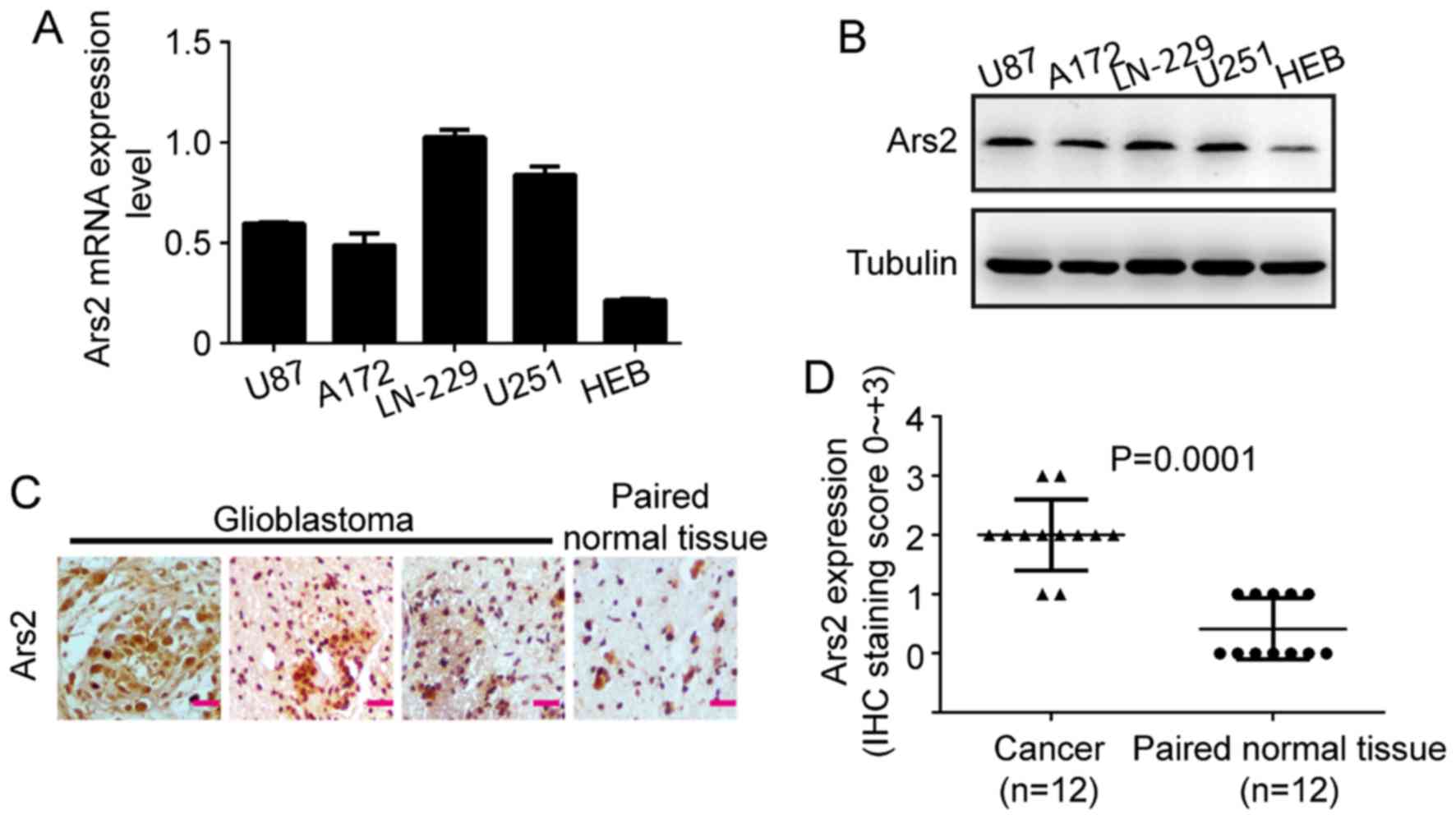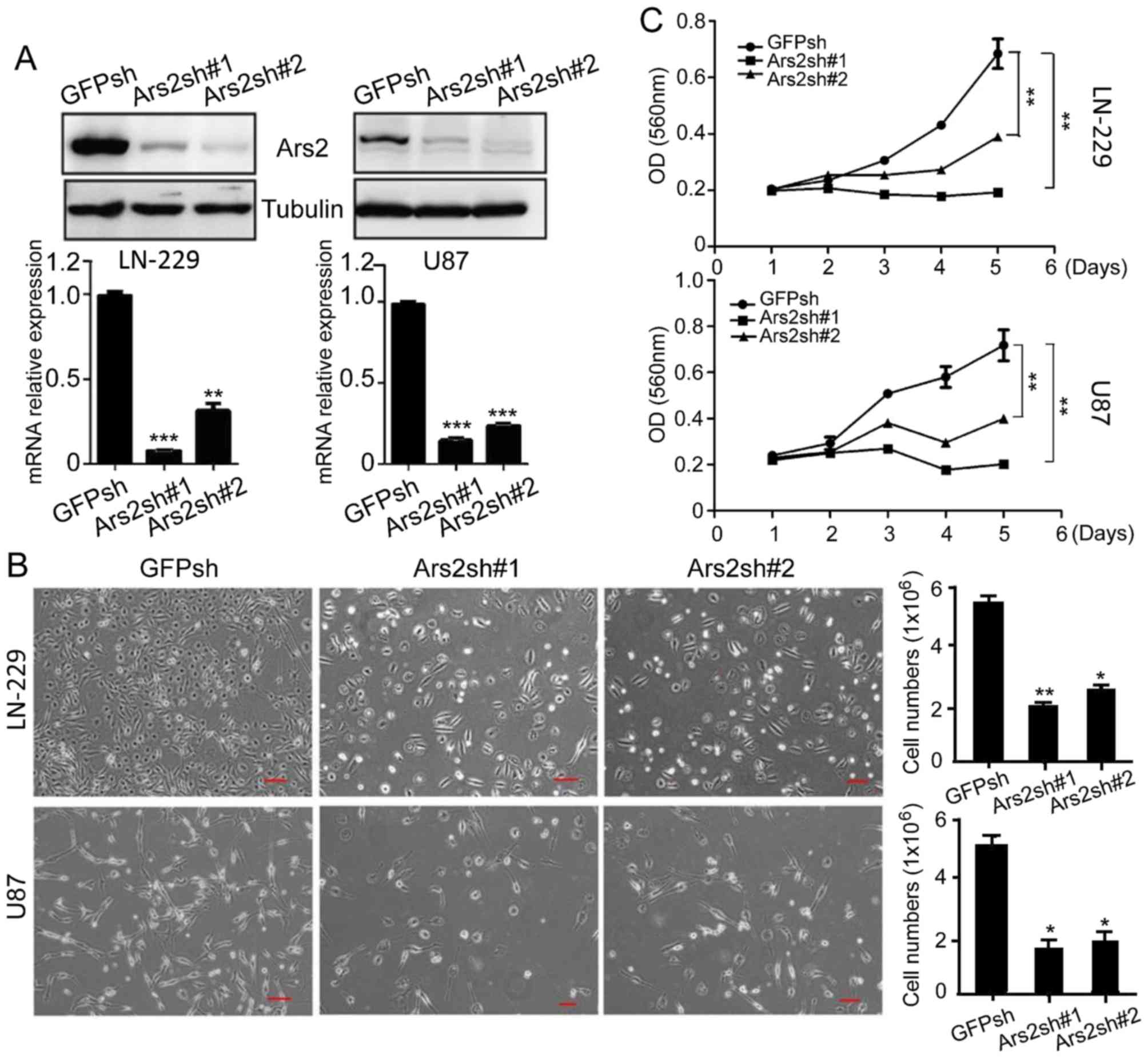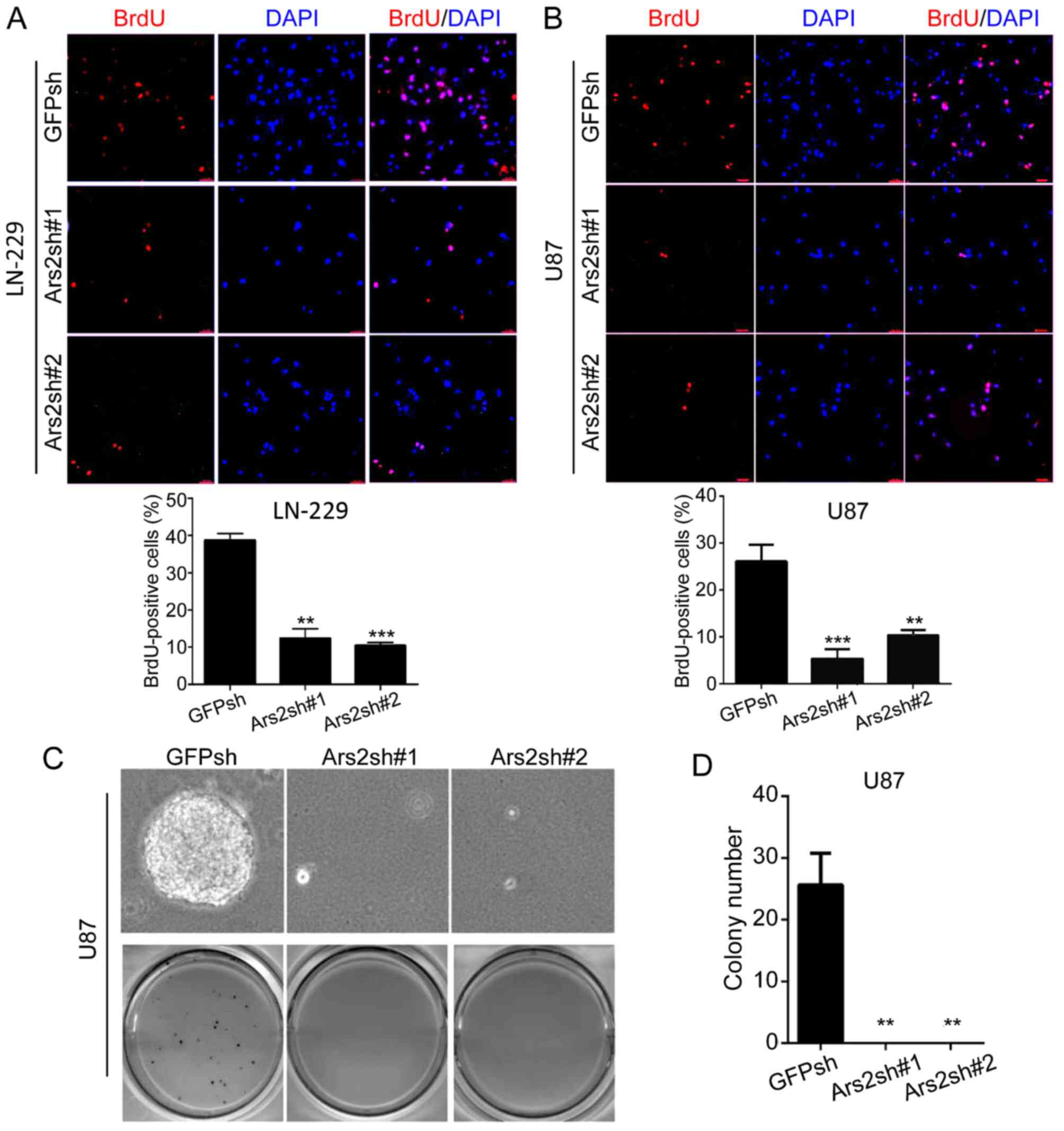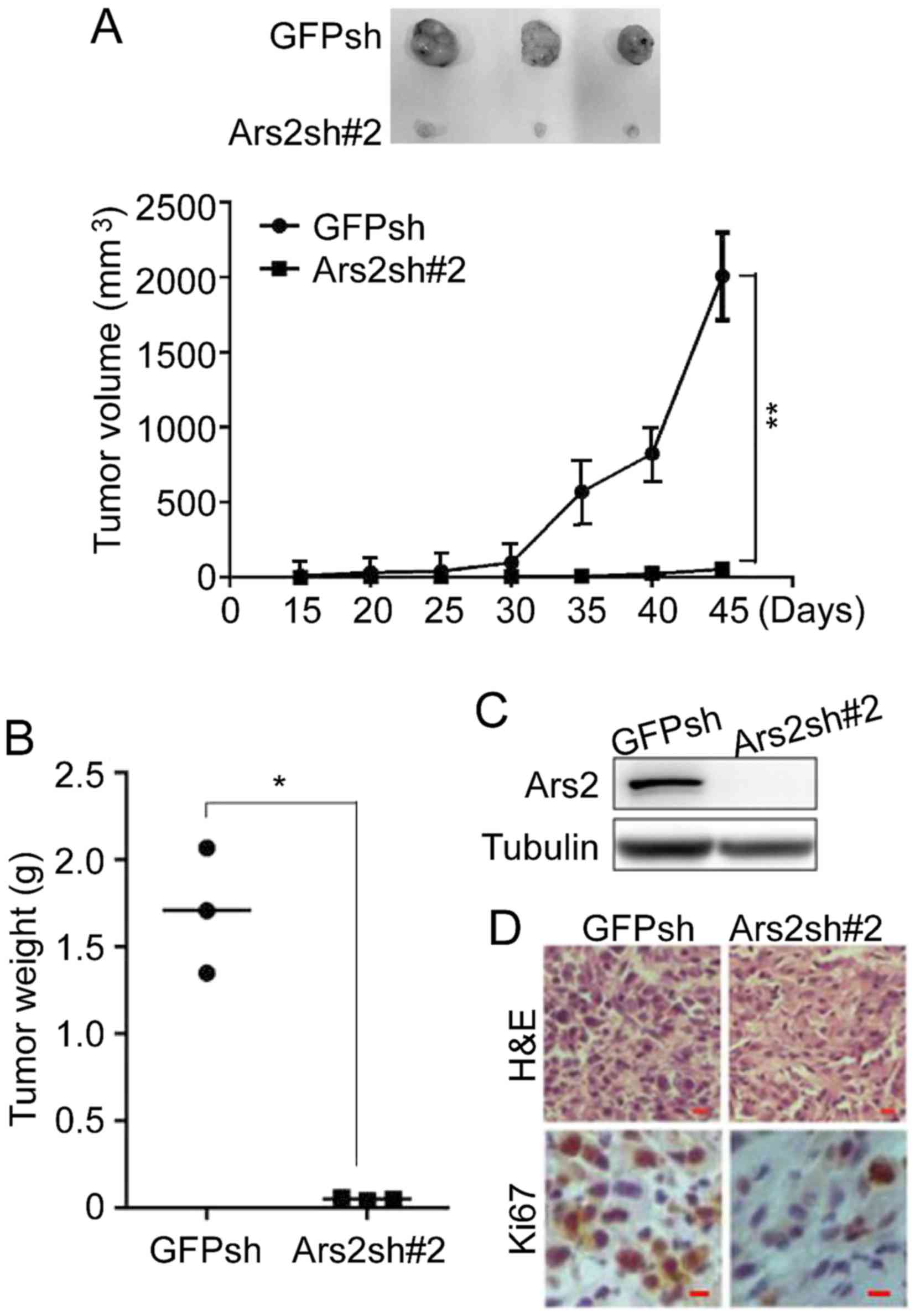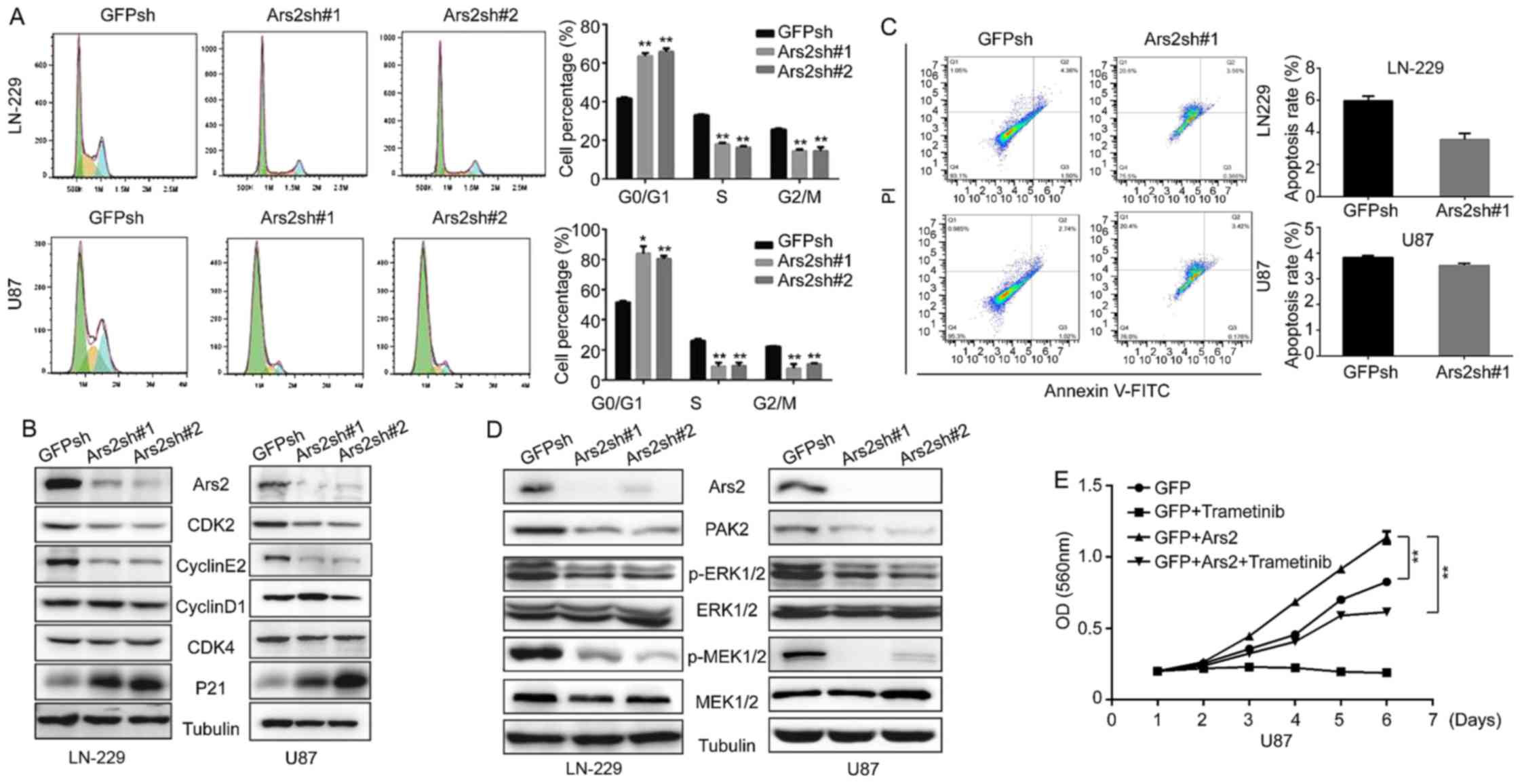|
1
|
Ostrom QT, Gittleman H, Farah P, Ondracek
A, Chen Y, Wolinsky Y, Stroup NE, Kruchko C and Barnholtz-Sloan JS:
CBTRUS statistical report: Primary brain and central nervous system
tumors diagnosed in the United States in 2006–2010. Neuro Oncol. 15
Suppl 2:ii1–56. 2013. View Article : Google Scholar : PubMed/NCBI
|
|
2
|
Rossman TG and Wang Z: Expression cloning
for arsenite-resistance resulted in isolation of tumor-suppressor
fau cDNA: Possible involvement of the ubiquitin system in arsenic
carcinogenesis. Carcinogenesis. 20:311–316. 1999. View Article : Google Scholar : PubMed/NCBI
|
|
3
|
Gruber JJ, Olejniczak SH, Yong J, La Rocca
G, Dreyfuss G and Thompson CB: Ars2 promotes proper
replication-dependent histone mRNA 3′ end formation. Mol Cell.
45:87–98. 2012. View Article : Google Scholar : PubMed/NCBI
|
|
4
|
Wilson MD, Riemer C, Martindale DW,
Schnupf P, Boright AP, Cheung TL, Hardy DM, Schwartz S, Scherer SW,
Tsui LC, et al: Comparative analysis of the gene-dense ACHE/TFR2
region on human chromosome 7q22 with the orthologous region on
mouse chromosome 5. Nucleic Acids Res. 29:1352–1365. 2001.
View Article : Google Scholar : PubMed/NCBI
|
|
5
|
Wilson MD, Wang D, Wagner R, Breyssens H,
Gertsenstein M, Lobe C, Lu X, Nagy A, Burke RD, Koop BF and Howard
PL: ARS2 is a conserved eukaryotic gene essential for early
mammalian development. Mol Cell Biol. 28:1503–1514. 2008.
View Article : Google Scholar : PubMed/NCBI
|
|
6
|
Prigge MJ and Wagner DR: The arabidopsis
serrate gene encodes a zinc-finger protein required for normal
shoot development. Plant Cell. 13:1263–1279. 2001. View Article : Google Scholar : PubMed/NCBI
|
|
7
|
Amsterdam A, Nissen RM, Sun Z, Swindell
EC, Farrington S and Hopkins N: Identification of 315 genes
essential for early zebrafish development. Proc Natl Acad Sci USA.
101:12792–12797. 2004. View Article : Google Scholar : PubMed/NCBI
|
|
8
|
Grigg SP, Canales C, Hay A and Tsiantis M:
SERRATE coordinates shoot meristem function and leaf axial
patterning in Arabidopsis. Nature. 437:1022–1026. 2005. View Article : Google Scholar : PubMed/NCBI
|
|
9
|
Yang L, Liu Z, Lu F, Dong A and Huang H:
SERRATE is a novel nuclear regulator in primary microRNA processing
in Arabidopsis. Plant J. 47:841–850. 2006. View Article : Google Scholar : PubMed/NCBI
|
|
10
|
Andreu-Agullo C, Maurin T, Thompson CB and
Lai EC: Ars2 maintains neural stem-cell identity through direct
transcriptional activation of Sox2. Nature. 481:195–198. 2011.
View Article : Google Scholar : PubMed/NCBI
|
|
11
|
Golling G, Amsterdam A, Sun Z, Antonelli
M, Maldonado E, Chen W, Burgess S, Haldi M, Artzt K, Farrington S,
et al: Insertional mutagenesis in zebrafish rapidly identifies
genes essential for early vertebrate development. Nat Genet.
31:135–140. 2002. View
Article : Google Scholar : PubMed/NCBI
|
|
12
|
Sabin LR, Zhou R, Gruber JJ, Lukinova N,
Bambina S, Berman A, Lau CK, Thompson CB and Cherry S: Ars2
regulates both miRNA- and siRNA- dependent silencing and suppresses
RNA virus infection in Drosophila. Cell. 138:340–351. 2009.
View Article : Google Scholar : PubMed/NCBI
|
|
13
|
Gruber JJ, Zatechka DS, Sabin LR, Yong J,
Lum JJ, Kong M, Zong WX, Zhang Z, Lau CK, Rawlings J, et al: Ars2
links the nuclear cap-binding complex to RNA interference and cell
proliferation. Cell. 138:328–339. 2009. View Article : Google Scholar : PubMed/NCBI
|
|
14
|
Denli AM, Tops BB, Plasterk RH, Ketting RF
and Hannon GJ: Processing of primary microRNAs by the
Microprocessor complex. Nature. 432:231–235. 2004. View Article : Google Scholar : PubMed/NCBI
|
|
15
|
Han J, Lee Y, Yeom KH, Kim YK, Jin H and
Kim VN: The Drosha-DGCR8 complex in primary microRNA processing.
Genes Dev. 18:3016–3027. 2004. View Article : Google Scholar : PubMed/NCBI
|
|
16
|
Landthaler M, Yalcin A and Tuschl T: The
human DiGeorge syndrome critical region gene 8 and Its D.
Melanogaster homolog are required for miRNA biogenesis. Curr Biol.
14:2162–2167. 2004. View Article : Google Scholar : PubMed/NCBI
|
|
17
|
He Q, Cai L, Shuai L, Li D, Wang C, Liu Y,
Li X, Li Z and Wang S: Ars2 is overexpressed in human
cholangiocarcinomas and its depletion increases PTEN and PDCD4 by
decreasing microRNA-21. Mol Carcinog. 52:286–296. 2013. View Article : Google Scholar : PubMed/NCBI
|
|
18
|
He Q, Huang Y, Cai L, Zhang S and Zhang C:
Expression and prognostic value of Ars2 in hepatocellular
carcinoma. Int J Clin Oncol. 19:880–888. 2014. View Article : Google Scholar : PubMed/NCBI
|
|
19
|
Livak KJ and Schmittgen TD: Analysis of
relative gene expression data using real-time quantitative PCR and
the 2(-Delta Delta C(T)) method. Methods. 25:402–408. 2001.
View Article : Google Scholar : PubMed/NCBI
|
|
20
|
Charafe-Jauffret E, Tarpin C, Bardou VJ,
Bertucci F, Ginestier C, Braud AC, Puig B, Geneix J, Hassoun J,
Birnbaum D, et al: Immunophenotypic analysis of inflammatory breast
cancers: identification of an ‘inflammatory signature’. J Pathol.
202:265–273. 2004. View Article : Google Scholar : PubMed/NCBI
|
|
21
|
Shiao YH, Palli D, Caporaso NE, Alvord WG,
Amorosi A, Nesi G, Saieva C, Masala G, Fraumeni JF Jr and Rice JM:
Genetic and immunohistochemical analyses of p53 independently
predict regional metastasis of gastric cancers. Cancer Epidemiol
Biomarkers Prev. 9:631–633. 2000.PubMed/NCBI
|
|
22
|
McDonald JW and Pilgram TK: Nuclear
expression of p53, p21 and cyclin D1 is increased in
bronchioloalveolar carcinoma. Histopathology. 34:439–446. 1999.
View Article : Google Scholar : PubMed/NCBI
|
|
23
|
Yamaguchi T, Kakefuda R, Tanimoto A,
Watanabe Y and Tajima N: Suppressive effect of an orally active
MEK1/2 inhibitor in two different animal models for rheumatoid
arthritis: a comparison with leflunomide. Inflamm Res. 61:445–454.
2012. View Article : Google Scholar : PubMed/NCBI
|
|
24
|
Yamaguchi T, Kakefuda R, Tajima N, Sowa Y
and Sakai T: Antitumor activities of JTP-74057 (GSK1120212), a
novel MEK1/2 inhibitor, on colorectal cancer cell lines in vitro
and in vivo. Int J Oncol. 39:23–31. 2011.PubMed/NCBI
|
|
25
|
Cappella P, Gasparri F, Pulici M and Moll
J: Cell proliferation method: Click chemistry based on BrdU
coupling for multiplex antibody staining. Curr Protoc Cytom. 72:7
34 31–17. 2015.
|
|
26
|
Gartel AL and Radhakrishnan SK: Lost in
transcription: p21 repression, mechanisms, and consequences. Cancer
Res. 65:3980–3985. 2005. View Article : Google Scholar : PubMed/NCBI
|
|
27
|
Deng C, Zhang P, Harper JW, Elledge SJ and
Leder P: Mice lacking p21CIP1/WAF1 undergo normal development, but
are defective in G1 checkpoint control. Cell. 82:675–684. 1995.
View Article : Google Scholar : PubMed/NCBI
|
|
28
|
Dulic V, Kaufmann WK, Wilson SJ, Tlsty TD,
Lees E, Harper JW, Elledge SJ and Reed SI: p53-dependent inhibition
of cyclin-dependent kinase activities in human fibroblasts during
radiation-induced G1 arrest. Cell. 76:1013–1023. 1994. View Article : Google Scholar : PubMed/NCBI
|
|
29
|
Meloche S and Pouyssegur J: The ERK1/2
mitogen-activated protein kinase pathway as a master regulator of
the G1- to S-phase transition. Oncogene. 26:3227–3239. 2007.
View Article : Google Scholar : PubMed/NCBI
|
|
30
|
Chambard JC, Lefloch R, Pouyssegur J and
Lenormand P: ERK implication in cell cycle regulation. Biochim
Biophys Acta. 1773:1299–1310. 2007. View Article : Google Scholar : PubMed/NCBI
|
|
31
|
Yao G, Lee TJ, Mori S, Nevins JR and You
L: A bistable Rb-E2F switch underlies the restriction point. Nat
Cell Biol. 10:476–482. 2008. View Article : Google Scholar : PubMed/NCBI
|
|
32
|
Waxman S and Anderson KC: History of the
development of arsenic derivatives in cancer therapy. Oncologist. 6
Suppl 2:S3–S10. 2001. View Article : Google Scholar
|
|
33
|
Fu WJ, Li BL, Wang SB, Chen ML, Deng RT,
Ye CQ, Liu L, Fang AJ, Xiong SL, Wen S, et al: Changes of the
tubular markers in type 2 diabetes mellitus with glomerular
hyperfiltration. Diabetes Res Clin Pract. 95:105–109. 2012.
View Article : Google Scholar : PubMed/NCBI
|
|
34
|
Fuster D, Torregrosa JV, Setoain X,
Doménech B, Campistol JM, Rubello D and Pons F: Localising imaging
in secondary hyperparathyroidism. Minerva Endocrinol. 33:203–212.
2008.PubMed/NCBI
|
|
35
|
Nigg EA: Cyclin-dependent protein kinases:
Key regulators of the eukaryotic cell cycle. Bioessays. 17:471–480.
1995. View Article : Google Scholar : PubMed/NCBI
|
|
36
|
Lavi O, Ginsberg D and Louzoun Y:
Regulation of modular Cyclin and CDK feedback loops by an E2F
transcription oscillator in the mammalian cell cycle. Math Biosci
Eng. 8:445–461. 2011. View Article : Google Scholar : PubMed/NCBI
|
|
37
|
Arellano M and Moreno S: Regulation of
CDK/cyclin complexes during the cell cycle. Int J Biochem Cell
Biol. 29:559–573. 1997. View Article : Google Scholar : PubMed/NCBI
|
|
38
|
Hiyama H, Iavarone A and Reeves SA:
Regulation of the cdk inhibitor p21 gene during cell cycle
progression is under the control of the transcription factor E2F.
Oncogene. 16:1513–1523. 1998. View Article : Google Scholar : PubMed/NCBI
|
|
39
|
Orlando DA, Lin CY, Bernard A, Wang JY,
Socolar JE, Iversen ES, Hartemink AJ and Haase SB: Global control
of cell-cycle transcription by coupled CDK and network oscillators.
Nature. 453:944–947. 2008. View Article : Google Scholar : PubMed/NCBI
|
|
40
|
Davies MA and Samuels Y: Analysis of the
genome to personalize therapy for melanoma. Oncogene. 29:5545–5555.
2010. View Article : Google Scholar : PubMed/NCBI
|
|
41
|
Musilova K and Mraz M: MicroRNAs in B-cell
lymphomas: How a complex biology gets more complex. Leukemia.
29:1004–1017. 2015. View Article : Google Scholar : PubMed/NCBI
|
|
42
|
Vosa U, Vooder T, Kolde R, Fischer K, Välk
K, Tõnisson N, Roosipuu R, Vilo J, Metspalu A and Annilo T:
Identification of miR-374a as a prognostic marker for survival in
patients with early-stage nonsmall cell lung cancer. Genes
Chromosomes Cancer. 50:812–822. 2011. View Article : Google Scholar : PubMed/NCBI
|
|
43
|
Wu H and Mo YY: Targeting miR-205 in
breast cancer. Expert Opin Ther Targets. 13:1439–1448. 2009.
View Article : Google Scholar : PubMed/NCBI
|
|
44
|
Gregory PA, Bert AG, Paterson EL, Barry
SC, Tsykin A, Farshid G, Vadas MA, Khew-Goodall Y and Goodall GJ:
The miR-200 family and miR-205 regulate epithelial to mesenchymal
transition by targeting ZEB1 and SIP1. Nat Cell Biol. 10:593–601.
2008. View Article : Google Scholar : PubMed/NCBI
|















